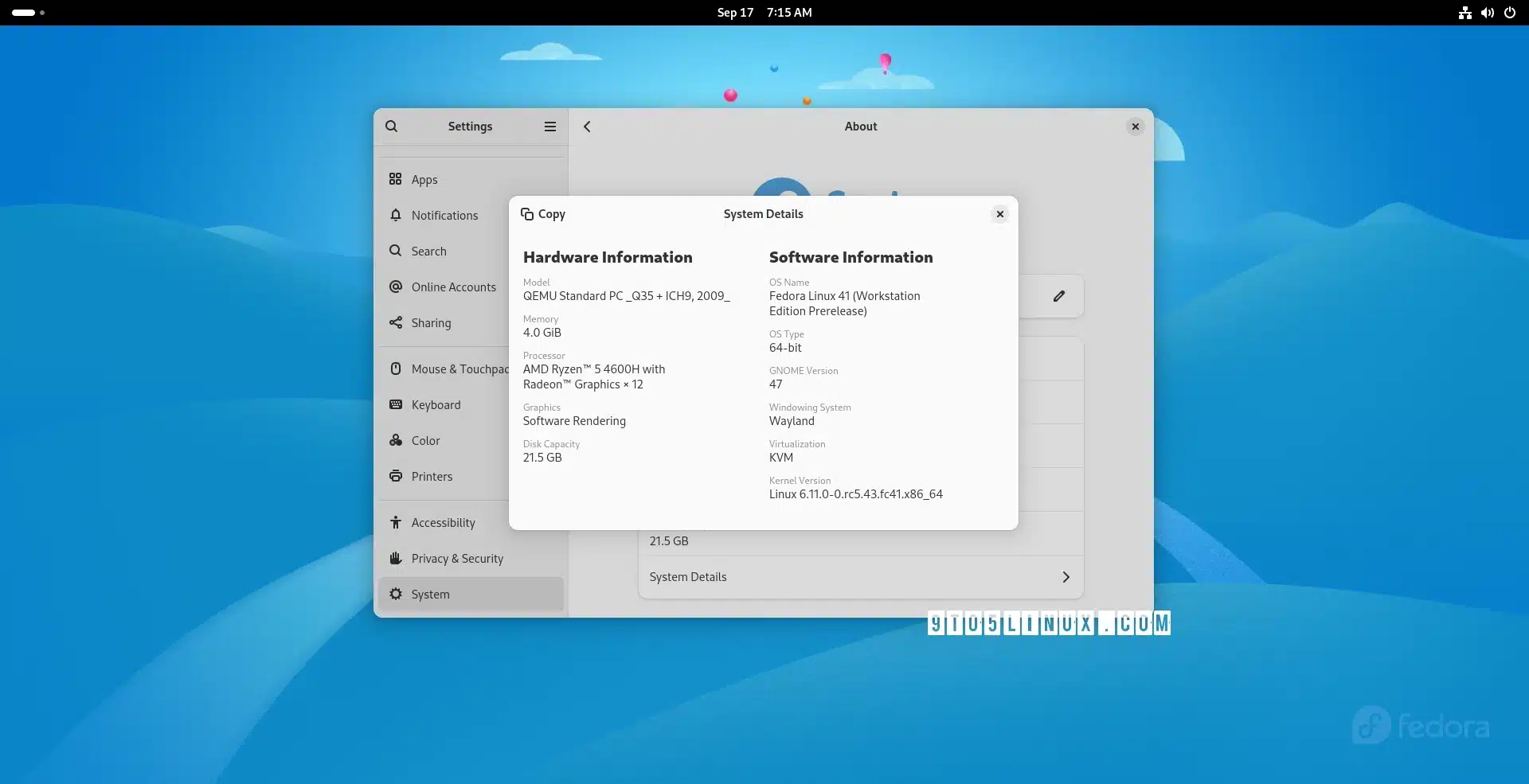The Fedora Project today announced the availability of the Fedora Linux 41 beta for public testing, providing an early look at upcoming features and encouraging users to identify and report any issues.
This release, powered by the newly released Linux 6.11 kernel, presents the latest GNOME 47 desktop environment in its main Fedora Workstation version, focusing solely on Wayland and reintroducing support for NVIDIA drivers installation with Secure Boot. Additionally, it includes the updated KDE Plasma 6.1 on the Fedora KDE Spin.
Key upgrades in Fedora Linux 41 include switching to DNF5 for improved package management, introduction of systemd service hardening to enhance security, a faster GnuTLS implementation through Kernel TLS (KTLS), the integration of ROCm 6.2 for AMD users, and activation of bootupd for Fedora Atomic Desktops and Fedora IoT.
Additions also comprise a novel command line utility ‘fedora-repoquery’ for querying package repositories across Fedora Linux, EPEL, eln, and CentOS Stream; support for self-encrypting drives during installation; Intel IPU6 camera compatibility; default use of composefs for Fedora CoreOS and Fedora IoT; and the separation of /usr/bin/dtrace from systemtap-sdt-devel into its own package, enhancing the efficiency of numerous buildroots.
Fedora Linux 41 beta is now out featuring a sophisticated set of default software, including the cutting-edge LibreOffice 24.8 alongside the latest Mozilla Firefox 130 browser. Fedora Linux 41, the suite is enhanced with the latest GNU toolchain updates like GCC 14 and GNU C Library 2.40, with additional technologies including RPM 4.20, Python 3.13, and Node.js 22.
The new beta also refines user experiences in image-mode Fedora by enabling DNF5 alongside rpm-ostree within containers and on client interfaces. It appoints “tuned” as the default power profile management daemon across Fedora Workstation, KDE Plasma, and Budgie editions, while supporting reproducible package builds.
Furthermore, this release introduces a new Fedora Spin called Fedora Miracle, which features the innovative Miracle-WM window manager. Fedora Linux 41, it provides an enhanced Wayland experience suitable for diverse platforms from high-end to low-end ARM and x86 devices.
Fedora Linux 41, projected for a final release between late October and early November 2024, Fedora Linux 41 can currently be pre-tested through its beta version, accessible via the official website. However, as it may have some unresolved issues, it is advised not to be installed on a primary system. For more details, see the release announcement page.
Last updated 10 hours ago
What are the key features of Fedora Linux 41 Beta?
1. New Linux Kernel and Desktop Environment
- Linux Kernel 6.11: This kernel update brings various performance and security improvements.
- GNOME 47: Focused entirely on Wayland, GNOME 47 features enhanced usability and better integration with modern hardware.
2. Updated Software and Tools
- Fedora Workstation: Now includes GNOME 47 and full support for Wayland. NVIDIA driver installation is re-enabled with Secure Boot support.
- Fedora KDE Spin: KDE Plasma 6.1 is included, offering users a polished and efficient desktop environment.
3. Package Management
- DNF5: The update to DNF5 promises faster and more reliable package management.
- Fedora-repoquery: A new utility for querying package repositories across Fedora, EPEL, CentOS Stream, and more.
4. Enhanced Security and Performance
- Systemd Service Hardening: Introduces enhanced security for systemd services.
- GnuTLS and Kernel TLS (KTLS): Provides a faster and more efficient TLS implementation.
- Intel IPU6 Camera Support: Adds compatibility for newer Intel camera hardware.
- Self-encrypting Drives: Fedora now supports self-encrypting drives during installation, ensuring data security by default.
5. New Fedora Spin: Fedora Miracle
- Fedora Miracle features the Miracle-WM window manager and aims to enhance the Wayland experience on diverse platforms, from high-end to ARM and x86 devices.
6. Other Notable Additions
- Composefs: Default for Fedora CoreOS and Fedora IoT.
- RPM 4.20 and GCC 14: Updated toolchains for better performance and compatibility.
- Python 3.13 and Node.js 22: Latest versions of these popular programming languages included.
ColoCrossing excels in providing enterprise Colocation Services, Dedicated Servers, VPS, and a variety of Managed Solutions, operating from 8 data center locations nationwide. We cater to the diverse needs of businesses of any size, offering tailored solutions for your unique requirements. With our unwavering commitment to reliability, security, and performance, we ensure a seamless hosting experience.
For Inquiries or to receive a personalized quote, please reach out to us through our contact form here or email us at sales@colocrossing.com.

